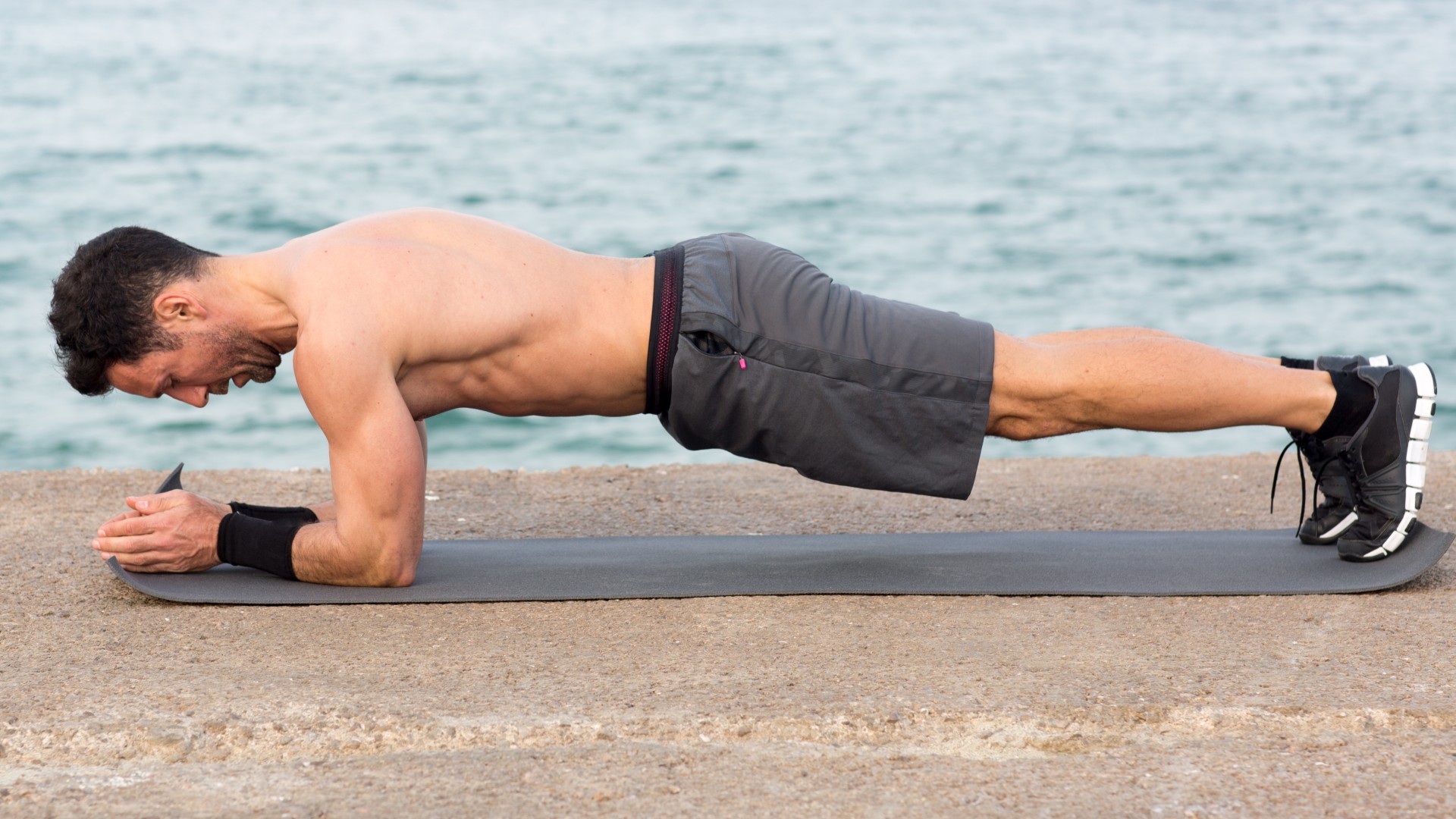
I’m all in plank variations, because — and this is not to throw any degree of shade on a workout staple that can’t stand up for itself — the basic plank is, after a short time, a pretty boring move.
I’ve done a few variations as challenges for Tom’s Guide, including the three-legged plank, the x-plank and the side plank, the one most people move on to when they find the standard move has become a little monotonous (which usually happens on day two).
And there are many more plank variations besides. As I've tried so many, I thought I was familiar with most of them, but the plank with knee tap was new for me, so I was eager to give it a go.
What is the plank with knee tap?
Well, it doesn’t involve tapping your knee with your hand, which was my first thought, and not one I welcomed. There is, in fact, a variation that involves exactly that action, but it tends to involve a high-plank (straight-arm) position.
For this one, you begin in a regular plank position, with your forearms on the floor. The plank is a static move, but this adaptation involves tapping your knees to the floor while you hold a position. You can do this one knee at a time or tap both together.
I went for the option one. Like all plank moves, it works the core, as well as the upper body; and, like some modified moves, it works parts of the lower body, too. In this case, it hits the quads, which I expected, and the glutes, which I did not.
How to do a plank with knee taps
- Begin in the forearm plank position, forming a straight line from your head to your feet (you don’t want to be arching or dropping your hips).
- Make sure your elbows are directly below your shoulders. You should be up on your toes, and you can have your hands flat on the floor or clasped. Engage your core and brace your body. You are now holding the plank position.
- From here, tap one knee gently on the floor, straighten the leg, and then tap with the other knee. You can either do this move to a set time, or you can count off knee taps.
- As you tap, maintain a plank position; don’t tilt your body one way or the other as you lower your knee.
- Start off with 30 taps, or 30 seconds, and see how you feel. If you have lower back issues, seek advice from a medical professional before trying this move. If you have sore knees, try these knee-strengthening exercises instead.
To begin with, I wanted to focus on hitting 50 repetitions of the plank with knee taps each day. So, I cleared some floor space and got to it. Here's what happened when I tried this core-focused exercise every day for a week.
Focus on your form
I strongly advise using a yoga mat for this move, even after you have learned to control the tapping, which may take a while. On that first day, I found I was not so much tapping my knees on the floor as smashing them, Hulk-like.
This was not only a bad form, but a deeply bad idea. Control is crucial here, both to protect your precious joints and to ensure you get maximum benefit from the move. How will you know when you’re doing it right?
Easy: Your knees will gently kiss the mat and your quads — those mighty muscles at the front of your thigh — will be wondering why this core move is making them work so hard. And even your glutes may end up asking what this exercise has to do with them. Quite a bit, as it turns out.
It's more interesting than the standard plank
One of the problems with maintaining the static plank is…well, the static part. Once in the position, there’s nothing else you can do except watch the seconds fly — then crawl — by, before seemingly and mysteriously coming to a stop while you’re only halfway to your goal time.
Looking down at the floor is not much fun at the best of times (you know, when you’ve done something wrong, or don’t want to volunteer for something that sounds as if the effort could be involved). Looking down at the floor while doing the plank is the capital of dullsville.
But when you’re tapping your knees on a mat while working to stay in position, the seconds zip along. Give your mind something else to occupy it and your body will get on with the splendid business of doing more than you thought possible.
Don't set a rep target
For the first couple of days, I counted knee taps — 50 to begin with — but when I moved on to a set time (one minute, at first), I was able to focus more on the controlled movement.
With no number to hit, I slowed down and paid attention to the smooth movement; this meant my quads and glutes were working harder, both on the motion and on keeping my body in plank position. Take care with this one that your core remains engaged, as you will probably be concentrating on the tapping.
By the end of the week, I had no idea how many times I was touching my knees to the mat, but I was up to two minutes in the plank position. My core felt tight and worked, as did my quads, glutes, and, to my surprise, my upper arms. You may not feel it, but your whole body is called up for the plank. It is a surprisingly efficient exercise.
My verdict on the plank with knee taps
Some workout moves seem so obvious that you wonder why you didn’t come up with them yourself. The plank with knee tap is such an exercise. With just a tiny tweak, a basic plank becomes a more interesting and more effective move.
It sounds fairly easy but stick with it and you’ll feel the effects. I will be adding this one to my set of core moves, and I’ve suggested it to others, who were skeptical until they tried it. Now we’re all in a position to get a stronger core.







